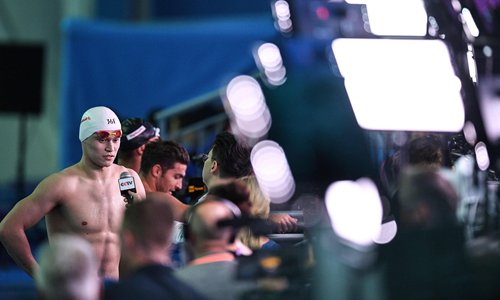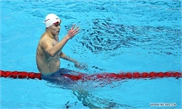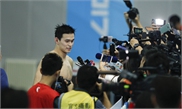SPORT / EXTRA TIME
How will swimmer Sun Yang restore his pride?

Sun Yang speaks to media at the final of the men’s 800-meter freestyle event during the swimming competition at the 2019 World Champion-ships in Gwangju, South Korea. File Photo: VCG
The eight-year ban was handed to Chinese swimming star Sun Yang for tampering with a test sample in 2018 and prompted him to post evidence online to "defend his innocence," but the move is expected to backfire as it violates Chinese law.
Sun's controversial Weibo posts have been deleted and included one of the three testers' personal ID card number. It has been widely circulated online thanks to Sun's 34 million-strong followers, some of whom have started labeling the testers as "traitors" and "scum."
Sun's reckless move revealed his "forceful personality," as the Court of Arbitration for Sport ruled in its decision, and he showed "no regret" for his own wrongdoings.
Sun, a three-time Olympic gold medalist, would have a better option on the September 2018 testing night: to allow the testers to take away the samples and then report his dissatisfaction over the testers' identity and profession to FINA, which would not influence his career had he tested negative.
But he chose a way that raised speculation of he may be tested positive, though the CAS decision has noted that Sun did not test positive before and after the test.
Sun will appeal the CAS decision with the Swiss Federal Tribunal, but the decision will likely remain unchanged as judicial recourse is allowed on a limited number of grounds, such as lack of jurisdiction and violation of elementary procedural rules.
Pundits have said the eight-year ban would mean Sun would have to retire, as younger athletes dominate the water sport. But if he retires, he will never have a chance to restore his reputation.
US swimmer Ryan Lochte has a similar record as Sun's.
The reputation of the six-time Olympic gold medalist and multiple-time world champion plunged in 2016 after the "Lochtegate" during Rio Olympics. What made things worse was a photo of him posted on Instagram in May 2018 that showed him receiving an intravenous injection, a move that led to a 14-month competition suspension.
At 35, Lochte remains competitive and has set his sights on the Tokyo Olympics, to restore his former pride.
If Lochte can be competitive at the age of 35, Sun could also make it in eight years, when he'll be 36 years old. To make an appearance at the 2028 Los Angeles Olympics would be a great opportunity for Sun.
But the biggest question remains: Will Sun's personality allow him to tolerate eight years of not being able to compete?


